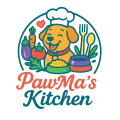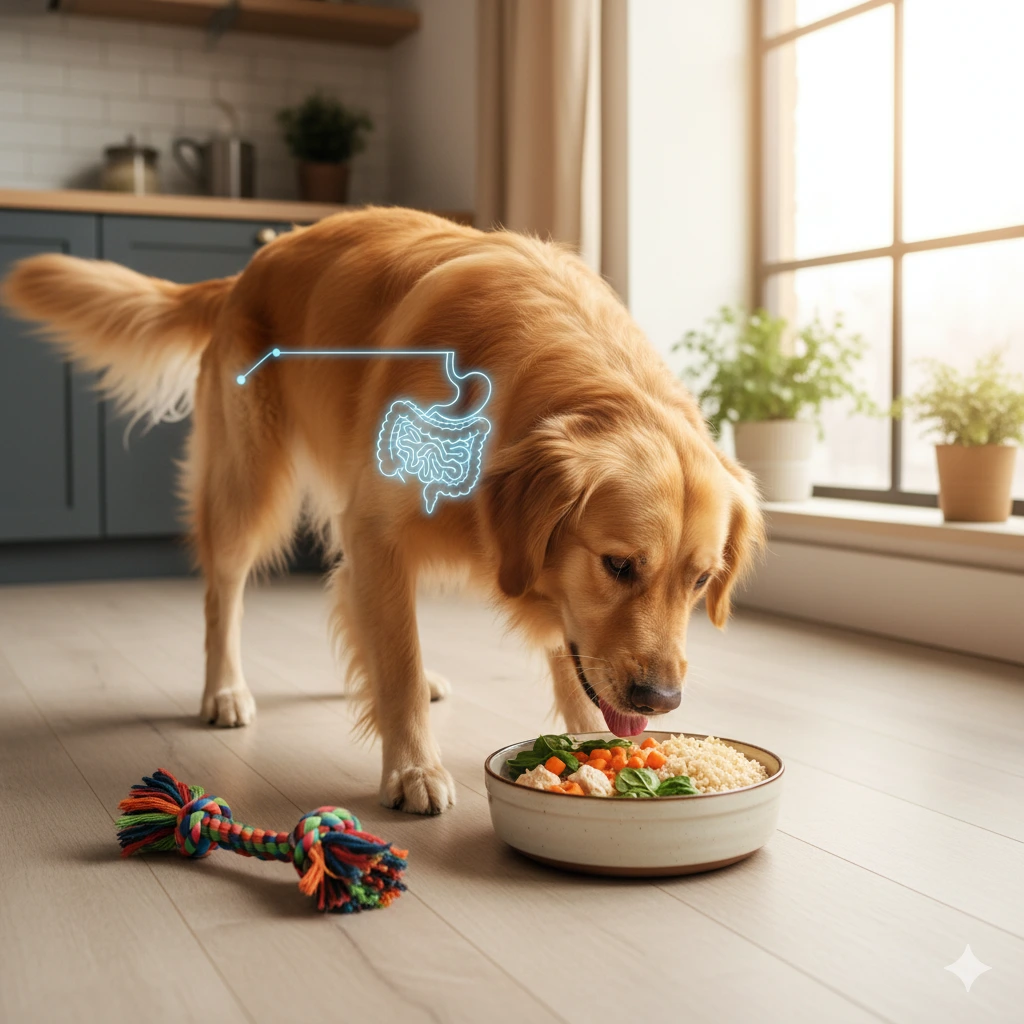When it comes to your dog’s wellbeing, many pet parents focus on exercise, playtime, and grooming. While all of these are important, the real foundation of a dog’s mood, energy, and overall health begins in the gut. Just like in humans, a healthy digestive system is crucial for nutrient absorption, immune function, and even mental wellbeing. Understanding your dog’s gut and how food impacts it can help you make smarter decisions about their diet and lifestyle.
Why Your Dog’s Gut Health Matters
The gut is home to trillions of bacteria, collectively known as the gut microbiome. These microbes play a critical role in digestion, vitamin production, and immune regulation. A healthy gut helps your dog:
- Digest and absorb nutrients efficiently
- Maintain a strong immune system
- Stay energetic and alert
- Regulate mood and behavior
Conversely, an unhealthy gut can lead to digestive issues, low energy, skin problems, and behavioral changes.
Signs of an Unhealthy Gut in Dogs
Knowing the warning signs can help you intervene before small issues become serious health problems. Watch for:
- Loose stools or constipation
- Excessive gas or bloating
- Poor coat condition or hair loss
- Lethargy or low energy
- Irritability or unusual behavior
If these signs persist, it’s important to consult your veterinarian and review your dog’s diet.
How Food Directly Impacts Your Dog’s Gut
1. Protein and Amino Acids
Protein is essential for building muscles and repairing tissues, but it also fuels good gut bacteria. High-quality sources like chicken, fish, beef, or lamb support a healthy digestive system and provide essential amino acids. Avoid low-quality meat by-products, which may be harder to digest and disrupt the gut microbiome.
2. Fiber for Digestive Health
Fiber regulates bowel movements, helps feed beneficial gut bacteria, and promotes satiety. Good fiber sources include pumpkin, carrots, peas, and oats. Fiber also helps prevent constipation and supports healthy weight management.
3. Healthy Fats
Fats are energy-dense and essential for a shiny coat, brain function, and hormone balance. Omega-3 and Omega-6 fatty acids, found in fish oil and flaxseed, also reduce inflammation in the gut and support overall digestive health.
4. Probiotics and Fermented Foods
Probiotics are live microorganisms that support gut health. They help maintain the balance between beneficial and harmful bacteria. Incorporating dog-safe probiotics or fermented foods like plain yogurt (unsweetened) can improve digestion and strengthen immunity.
5. Avoid Artificial Additives
Many commercial pet foods contain preservatives, artificial colors, and flavors that can irritate the gut and trigger allergies. Feeding fresh, wholesome meals from trusted sources like Pawma’s Kitchen reduces exposure to these harmful ingredients.
The Link Between Gut Health and Mood
Research increasingly shows that the gut and brain communicate through the gut-brain axis. For dogs, this means a healthy gut can improve:
- Mood stability and reduced anxiety
- Willingness to engage in play and exercise
- Overall happiness and calmness
Conversely, digestive distress can make dogs irritable, restless, or lethargic. By prioritizing gut-friendly foods, you’re directly supporting your pet’s emotional wellbeing.
The Role of Hydration
Water is a critical but often overlooked part of gut health. Proper hydration aids digestion, helps transport nutrients, and prevents constipation. Always ensure your dog has access to fresh, clean water.
Tips for Supporting Your Dog’s Gut Health
1. Choose Quality Ingredients
Feed your dog meals with whole, fresh ingredients. Lean proteins, seasonal vegetables, and grains are ideal.
2. Introduce Prebiotics
Prebiotics are non-digestible fibers that feed good gut bacteria. Foods like pumpkin, banana, and oats are safe and effective options.
3. Avoid Overfeeding
Excessive portions can overload the digestive system, leading to discomfort and weight gain.
4. Transition Slowly
When switching foods, do it gradually over 7–10 days to prevent stomach upset. Start with small amounts and increase slowly.
5. Consider Fresh or Homemade Meals
Freshly prepared meals, like those from Pawma’s Kitchen, are nutritionally balanced, easy to digest, and free from harmful preservatives. These meals can dramatically improve gut health and overall vitality.
How to Know Your Dog’s Gut is Thriving
A happy gut often manifests in visible ways:
- Glossy coat and healthy skin
- Consistent energy levels
- Normal, firm stools
- Alert, playful, and calm behavior
If you notice these positive changes after adjusting your dog’s diet, it’s a good sign that their digestive system is functioning well.
Final Thoughts
Understanding your dog’s gut is the first step toward holistic health. The food you choose directly affects their mood, energy, and overall wellbeing. By feeding high-quality, gut-friendly meals and avoiding harmful additives, you can support a strong digestive system, a vibrant coat, and a happy, energetic dog.
Brands like Pawma’s Kitchen make it easier than ever to provide fresh, balanced, and digestible meals that nourish the gut and promote long-term health. Remember, a healthy gut isn’t just about digestion — it’s the key to a happier, more energetic, and resilient pet.



